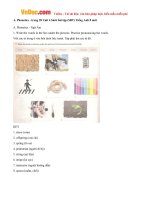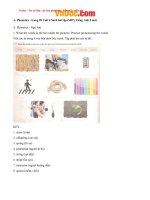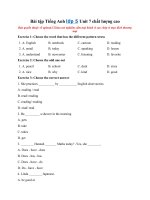Unit 4 customs and traditions (1)
Bạn đang xem bản rút gọn của tài liệu. Xem và tải ngay bản đầy đủ của tài liệu tại đây (86.07 KB, 4 trang )
<span class="text_page_counter">Trang 1</span><div class="page_container" data-page="1">
<b>Fullname:……… Class: 8TEST 1 UNIT 4</b>
<b>EX1. I. Choose the word which has a different sound in the part underlined.</b>
3. A. occupation B. occasion C. shake D. miraculous 4. A. concerned B. received C. attached D. concealed
7. A. included B. received C. remembered D. annoyed
<b>EX2. III. Choose the best answer A, B, C or D to complete the sentences.</b>
<i>1. The wai is the traditional </i> of people in Thailand.
2. When two Maori people meet, they each other’s noses.
3. Do you know the way to welcome people in Tibet?
A. custom B. customer C. customary D. tradition 4. The xoe dance is a spiritual of Thai ethnic people.
5. In Viet Nam you shouldn’t use only the first name to people older than you.
6. We are going to prepare sticky rice served with grilled chicken for the celebration. A. five-coloured B. five-colours C. five-colour D. five colours
7. A tradition is something special that is through the generations. A. passed B. passed to C. passed down D. passed out
8. According to the in England, we have to use a knife and folk at dinner. A. table ways B. table manners C. behaviours D. differences
9. We have to our shoes when we go inside a pagoda.
A. put on B. give off C. turn off D. take off
</div><span class="text_page_counter">Trang 2</span><div class="page_container" data-page="2"><b>EX3. IV. Choose the best answer A, B, C or D.</b>
1. My parents usually ... work very early.
2. There is a computer ... the middle ... the room. A. in / of B. in / in C. on / of D. on / in
3. Nam has to leave to tidy his room every day.
4. Nga ... have a holiday in Da Lat next summer.
A. is going B. will to C. are going to D. is going to 5. Lan isn’t ... to go to school today.
A. enough well B. enough good C. well enough D. good enough 6. Boys and girls, you’ll have to do this experiment ... this afternoon.
A. youself B. yourselves C. yourself D. youselves
7. We must put all the small objects such as beads out ... children’s reach.
8. You are too thin. You ... eat much more meat.
A. ought B. ought not C. ought to D. ought not to 9. I and my pen friend ... Ho Chi Minh’s Mausoleum last Sunday.
10. Let us ... to the school’s library next Monday.
11. Peter doesn’t talk much in public. He’s rather ...
12. You must not let children play in the street because it is ...
13. He’ll come ... to pick you ...
A. over / up B. over / on C. in / up D. on / in
14. The sun always ... in the East and ... in the West. A. rise/ set B. rises/ set C. rises/ sets D. has risen/ set 15. He spends most of his time ... charity work.
<b>EX4.</b>
<b>. Complete the sentences with a form of “have to” or “should”. Make the verbsnegative when necessary.</b>
1. You come with me if you don’t want to. I’ll go on my own.
2. If you need some help with your homework, you go to the library. 3. If you have a ticket, you queue. You can go straight in. 4. You tell lies. It’s wrong.
5. Nick works too much. I think he take it easy. 6. Your hair’s too long. I think you get it cut. 7. Your clothes are dirty. You wash them.
8. I’m going to bed. I get up early tomorrow.
</div><span class="text_page_counter">Trang 3</span><div class="page_container" data-page="3">9. I’d like to meet your best friend. You invite him/ her round. 10.I tell my parents where I am, then they don’t worry.
<b>EX5.VI. Rewrite the sentences using “should/ shouldn’t”.</b>
1. Don’t touch this switch. 6. Why didn’t they tell me about these changes earlier?
I should have been ... 7. Don’t lean against the newly-painted wall.
<b>EX6.IX. Rewrite and complete the sentences using “should”.Ex: If I were you, I’d go to the doctor’s.</b>
I think you should go to the doctor’s. 1. It’s a good idea to wear a warm coat.
You ... 2. My advice is to leave early.
I think you...
</div><span class="text_page_counter">Trang 4</span><div class="page_container" data-page="4">3. It’s a good idea to take more exercise.
<b>EX7. X. Find and correct the mistakes of these sentences</b>
1. He don’t go to the class today.
</div>








